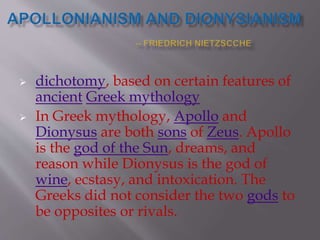
Apollo and Dionysus in Greek Tragedy
- 1. dichotomy, based on certain features of ancient Greek mythology In Greek mythology, Apollo and Dionysus are both sons of Zeus. Apollo is the god of the Sun, dreams, and reason while Dionysus is the god of wine, ecstasy, and intoxication. The Greeks did not consider the two gods to be opposites or rivals.
- 5. Nietzsche’s Major Premise: the fusion of Dionysian and Apollonian artistic impulses forms dramatic arts, or tragedies. This fusion has not been achieved since the ancient Greek tragedians. The works of Aeschylus and Sophocles represent the apex of artistic creation, the true realization of tragedy; it is with Euripides, he states, that tragedy begins its decline, deterioration, downfall, death. Nietzsche objects to Euripides' use of Socratic rationalism in his tragedies, claiming that the infusion of ethics and reason robs tragedy of its foundation, namely the fragile balance of the Dionysian and Apollonian.
- 6. Apollonian and Dionysian are terms used by Nietzsche in The Birth of Tragedy to designate the two central principles in Greek culture. The Apollonian, which corresponds to the “principle of individuation”, is the basis of all analytic distinctions. Everything that is part of the unique individuality of man or thing is Apollonian in character; all types of form or structure are Apollonian, since form serves to define or individualize that which is formed; thus, sculpture is the most Apollonian of the arts, since it relies entirely on form for its effect. Rational thought is also Apollonian since it is structured and makes distinctions.
- 7. The Dionysian is directly opposed to the Apollonian. Drunkenness and madness are Dionysian because they break down a man's individual character; all forms of enthusiasm and ecstasy are Dionysian, for in such states man gives up his individuality and submerges himself in a greater whole: music is the most Dionysian of the arts, since it appeals directly to man's instinctive, chaotic emotions and not to his formally reasoning mind.
- 8. Nietzsche believed that both forces were present in Greek tragedy, and that the true tragedy could only be produced by the tension between them. He used the names Apollonian and Dionysian for the two forces because Apollo, as the sun-god, represents light, clarity, and form, whereas Dionysus, as the wine-god, represents drunkenness and ecstasy.
- 9. Friedrich Nietzsche used the term in his book The Birth of Tragedy to describe one of the two opposing tendencies or elements in Greek tragedy. According to Nietzsche, the Apollonian attributes are reason, culture, harmony, and restraint. These are opposed to the Dionysian characteristics of excess, irrationality, lack of discipline, and unbridled passion. The Apollonian and Dionysian coalesce to create the tragic story, with the Apollonian tendency represented by the dialogue and the Dionysian by the dithyrambic choruses. The drama's exhibition of the phenomena of suffering individuals (Apollonian elements) forces upon the audience the struggle, “the pain, the destruction of phenomena,” which in turn communicates “the exuberant fertility of the universal.” The spectators then become, as it were, one with the infinite primordial joy in existence, and we anticipate, in Dionysian ecstasy, the indestructibility and eternity of this joy.
- 10. Greek tragedy was the result of a fusion of Dionysian and Apollonian elements.
- 11. The two elements of tragedy, says Nietzsche, are the Apollonian (related to the Greek god Apollo, here used as a symbol of measured restraint) and the Dionysian (from Dionysus, the Greek god of ecstasy). His conception of the Apollonian is the equivalent of what Schopenhauer called the individual phenomenon—the particular chance, error, or man, the individuality of which is merely a mask for the essential truth of reality which it conceals. The Dionysian element is a sense of universal reality, which, according to Schopenhauer, is experienced after the loss of individual egoism. The “Dionysian ecstasy,” as defined by Nietzsche, is experienced “not as individuals but as the one living being, with whose creative joy we are united.”
- 12. The drama's exhibition of the phenomena of suffering individuals (Apollonian elements) forces upon the audience “the struggle, the pain, the destruction of phenomena,” which in turn communicates “the exuberant fertility of the universal.” The spectators then “become, as it were, one with the infinite primordial joy in existence, and . . . we anticipate, in Dionysian ecstasy, the indestructibility and eternity of this joy.” Thus, he says, there is a desire “to see tragedy and at the same time to get beyond all seeing . . . to hear and at the same time long to get beyond all hearing.”
